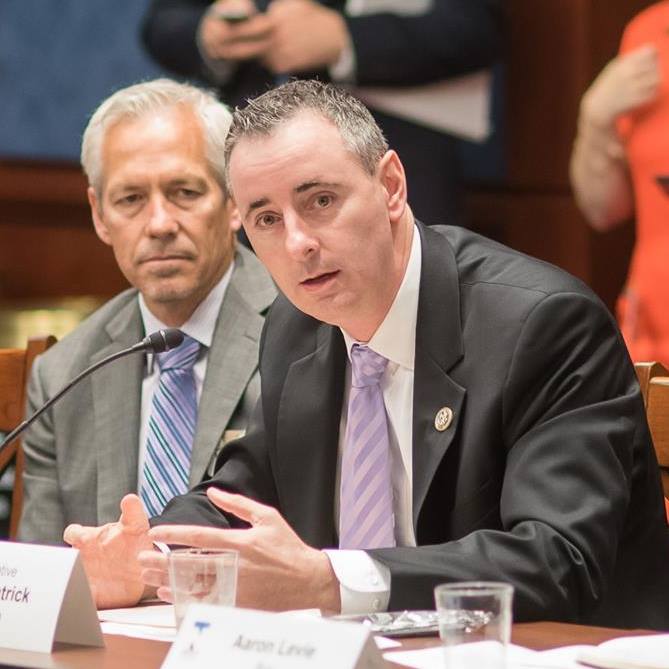As new energy technologies increase demand for rare earth elements and materials, one local congressman is touting a proposal to increase domestic production.
U.S. Rep. Brian Fitzpatrick (R-Bucks) and New Jersey Democrat Rep. Josh Gotthemier recently announced the Restoring Essential Energy and Security Holdings Onshore for Rare Earths (REEShore) Act. The legislation is a companion to a bipartisan bill introduced in the Senate.
It seeks to strengthen the Department of Defense’s rare earth element reserves, according to a statement from Fitzpatrick’s office. Backers of the bill hope to decrease reliance on China. In 2021, 78 percent of rare earth imports were from China, according to the U.S. Geological Survey.
“We cannot let the Chinese Communist Party continue to benefit from supplying our country with necessary rare earth materials,” Fitzpatrick said. “We will decrease our reliance on the CCP for these resources and will allow the United States to resume its rightful position as a leader in rare earth elements production.”
China’s dominance in the production of rare earth elements has made a once-sleepy issue prominent, according to Bojeong Kim, associate professor at the Earth and Environmental Science Department at Temple University.
“China has been a really big player for rare earth elements,” she said. “The awareness is that now the U.S. government has started to realize to rely on China on these issues is not reliable.”
The concern is that if China were to cut countries off of their rare earth supply, it could spark a crisis. The U.S. Geological Survey reported China accounted for 60 percent globally of rare earth mining production in 2021, up slightly from 2020. So boosting domestic production is a national security issue on the minds of legislators.
Rare earths are especially in demand right now as the U.S. looks toward different renewable energies. They are essential in wind turbines, solar cells, and electrical vehicle creation. The material is also important in smartphone, television, and computer production.
“These elements are good for high-performance applications,” Kim said. “Magnets, aircraft engines, something that’s part of our lives. It’s just that we don’t think that they require the presence of rare-earth elements.”
The Senate version of the bill looks to establish a strategic rare earth metal and products reserve. Additionally, it seeks to restrict rare earth metals processed or refined in China from entering the country.
Conor Bernstein, a spokesperson for the National Mining Association, called the REEShore Act an important first step in making the U.S. more resource independent.
“Now is the moment to take strong action to re-shore this critical piece of our industrial base,” Bernstein told DVJournal. “While this legislation focuses on rare earths, we hope Congress will acknowledge and act quickly to address our unnecessary dependence on imports for a wide range of minerals that are domestically available.”
Bernstein’s additional statement reflects the battle currently ongoing at the national level. Many environmentalists want to protect lands from harmful mining procedures, while simultaneously many of the minerals needed for renewable energy processes that environmentalists support, must be mined.
That was why Kim said a focus of research right now is discovering a new mining technique that would be more environmentally friendly.
“We are trying to come up with different ways of mining, which is not as effective as the traditional mining processes that we have,” she said. “We have these elements, but we are not going to mine them in the way we used to.”
Kim added governments are looking into localized reservoirs to see how mining can be facilitated at individual locations.
Fitzpatrick is not the first local representative to elevate the issue of rare earth minerals. Congresswoman Chrissy Houlahan (D-Chester) introduced the Securing America’s Rare Earths Supply Act of 2019 in the previous Congress and supported an amendment to the FY2021 National Defense Authorization Act surrounding rare earths.
While a spokesperson for Houlahan could not say if she would support the bill or not until the legislation’s text is available, she reaffirmed Houlahan’s focus on the issue and expressed interest in the proposal.
“Rep. Houlahan is committed to securing our supply chains, and ensuring that critical resources like rare earths can’t be monopolized by China,” the spokesperson said. “The bill co-leads are colleagues of Rep. Houlahan on the Problem Solvers Caucus, and she looks forward to seeing final text and working with them in a bipartisan fashion.”
Please follow DVJournal on social media: Twitter@DVJournal or Facebook.com/DelawareValleyJournal

